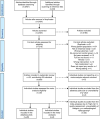Animal-Assisted Interventions Improve Mental, But Not Cognitive or Physiological Health Outcomes of Higher Education Students: a Systematic Review and Meta-analysis
- PMID: 36406903
- PMCID: PMC9666958
- DOI: 10.1007/s11469-022-00945-4
Animal-Assisted Interventions Improve Mental, But Not Cognitive or Physiological Health Outcomes of Higher Education Students: a Systematic Review and Meta-analysis
Abstract
Due to the high burden of mental health issues among students at higher education institutions world-wide, animal-assisted interventions (AAIs) are being used to relieve student stress. The objective of this study was to systematically review of the effects of AAIs on the mental, physiological, and cognitive outcomes of higher education students. Randomized controlled trials using any unfamiliar animal as the sole intervention tool were included in this review. Study quality was assessed using the Cochrane Risk-of-Bias tool. Where possible, effect sizes (Hedges' g) were pooled for individual outcomes using random-effects meta-analyses. Albatross plots were used to supplement the data synthesis. Of 2.494 identified studies, 35 were included. Almost all studies used dogs as the intervention animal. The quality of most included studies was rated as moderate. Studies showed an overall reduction of acute anxiety and stress. For other mental outcomes, studies showed smaller, but nonetheless beneficial effects. Studies showed no clear effect on physiological or cognitive outcomes. Strong methodological heterogeneity between studies limited the ability to draw clear conclusions.
Supplementary information: The online version contains supplementary material available at 10.1007/s11469-022-00945-4.
Keywords: Animal-assisted intervention; Higher education; Mental health; One Health; Systematic review.
© The Author(s) 2022.
Conflict of interest statement
Competing InterestsThe authors declare no competing interests.
Figures







Similar articles
-
Impact of summer programmes on the outcomes of disadvantaged or 'at risk' young people: A systematic review.Campbell Syst Rev. 2024 Jun 13;20(2):e1406. doi: 10.1002/cl2.1406. eCollection 2024 Jun. Campbell Syst Rev. 2024. PMID: 38873396 Free PMC article. Review.
-
Small class sizes for improving student achievement in primary and secondary schools: a systematic review.Campbell Syst Rev. 2018 Oct 11;14(1):1-107. doi: 10.4073/csr.2018.10. eCollection 2018. Campbell Syst Rev. 2018. PMID: 37131395 Free PMC article.
-
Recovery schools for improving behavioral and academic outcomes among students in recovery from substance use disorders: a systematic review.Campbell Syst Rev. 2018 Oct 4;14(1):1-86. doi: 10.4073/csr.2018.9. eCollection 2018. Campbell Syst Rev. 2018. PMID: 37131375 Free PMC article.
-
The future of Cochrane Neonatal.Early Hum Dev. 2020 Nov;150:105191. doi: 10.1016/j.earlhumdev.2020.105191. Epub 2020 Sep 12. Early Hum Dev. 2020. PMID: 33036834
-
Targeted school-based interventions for improving reading and mathematics for students with or at risk of academic difficulties in Grades K-6: A systematic review.Campbell Syst Rev. 2021 Apr 6;17(2):e1152. doi: 10.1002/cl2.1152. eCollection 2021 Jun. Campbell Syst Rev. 2021. PMID: 37131926 Free PMC article. Review.
Cited by
-
Australian University Students' Experience of Animal-Assisted Education: An Exploratory Study.Animals (Basel). 2024 Sep 27;14(19):2792. doi: 10.3390/ani14192792. Animals (Basel). 2024. PMID: 39409741 Free PMC article.
-
The Impact of Psychosocial Factors on the Human-Pet Bond: Insights from Cat and Dog Owners.Animals (Basel). 2025 Jun 26;15(13):1895. doi: 10.3390/ani15131895. Animals (Basel). 2025. PMID: 40646794 Free PMC article.
-
Selection of Appropriate Dogs to Be Therapy Dogs Using the C-BARQ.Animals (Basel). 2023 Feb 24;13(5):834. doi: 10.3390/ani13050834. Animals (Basel). 2023. PMID: 36899691 Free PMC article.
-
Co-Producing Paws on Campus: A Psychoeducational Dog-Facilitated Programme for University Students Experiencing Mental Health Difficulties.Int J Environ Res Public Health. 2024 Aug 14;21(8):1066. doi: 10.3390/ijerph21081066. Int J Environ Res Public Health. 2024. PMID: 39200675 Free PMC article.
-
The effect of animal-assisted intervention on undergraduate students' perception of momentary stress.Front Psychol. 2023 Dec 22;14:1253104. doi: 10.3389/fpsyg.2023.1253104. eCollection 2023. Front Psychol. 2023. PMID: 38187421 Free PMC article.
References
-
- Anxiety and Depression Association of America. (2022, November 6). Facts. https://adaa.org/finding-help/helping-others/college-students/facts
-
- APA. (2018, November 1). Stress effects on the body. Stress. https://www.apa.org/topics/stress-body
-
- Austin E, Saklofske D, Mastoras S. Emotional intelligence, coping and exam-related stress in Canadian undergraduate students. Australian Journal of Psychology. 2010;62(1):42–50. doi: 10.1080/00049530903312899. - DOI
Associated data
LinkOut - more resources
Full Text Sources
